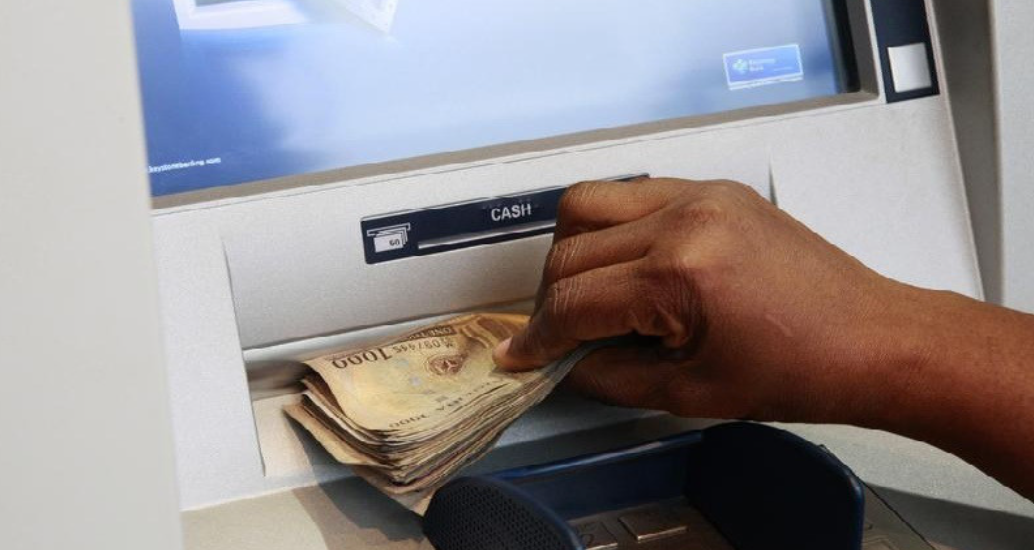Business
ATMs empty as banks ration withdrawals

ATMs empty as banks ration withdrawals
The Automated Teller Machines of Deposit Money Banks have consistently remained empty in recent months as banks grapple with a sustained low cash supply.
It was also gathered on Wednesday that some DMBs, particularly in the Federal Capital Territory, have begun another round of cash rationing, restricting maximum over-the-counter withdrawals to a daily limit between N5,000 and N20,000.
While banks struggle to get cash, Point-of-Sales operators have been fulfilling the cash needs of customers.
Speaking at the Facts Behind the Rights Issue Presentation of FBN Holdings at the Nigerian Exchange Limited recently, the Executive Director/Chief Financial Officer of First Bank, Patrick Iyamabo, said that the matter was an industry-wide one and not peculiar to a specific bank.
He said, “It is an industry problem. Most customers after exhausting the options available in other banks, tend to settle at FirstBank to address their cash needs. The challenge differs by location but we know it is a challenge that the regulator is looking into to address. But as we speak of physical cash, we must appreciate that the direction of the industry is to go digital.
“A lot of our customers do most of their transactions digitally, and you heard the GMD speak to this, very often people don’t want to transact in cash. In terms of this new order, your bank, FirstBank is very well positioned so if you look at the statistics and I’m speaking to independent statistics, just pick up your NIBSS report, the bank with the most stable platform meaning availability to always transact digitally is FirstBank. So, all our customers have the benefits of having their cash in First Bank and having access to this cash anytime anywhere and as necessary. It’s a huge advantage.”
Speaking anonymously with The PUNCH, a banker at a tier-1 bank put the blame on the Central Bank of Nigeria.
“It is what CBN has given us that we are using. We are confined within the limits of what is available to us. Also, because we are a big operation, we have to deal with many other businesses.
“Have you also noticed that there is a boom in the PoS business? Those people don’t take their money to the banks. The money comes out of the banks and it stays within their circle. They warehouse their funds, unlike you and I who would withdraw money and spend it which will eventually find itself back into the formal banking system. It is not the same with them. They warehouse their funds and distribute it among themselves.”
According to data from the CBN, currency outside the banks hit N4.02tn in September from N3.86tn in August. This brings it closer to the value of currency in circulation which stood at N4.31tn in September.
Meanwhile, some PoS operators on Lagos Island have increased their charges from N200 for cash of N10,000 to N300.
This was observed at both the CMS bus stop and at Obalende. However, off Lagos Island, the rates had remained at N200 for cash withdrawal of N10,000.
It was further gathered that banks have begun cash rationing, restricting maximum over-the-counter withdrawals to a daily limit between N5,000 and N20,000.
Findings by The PUNCH showed that the development is gradually leading to cash shortage, as many ATMs were non-functional, leaving customers with no choice but to seek alternative means of withdrawing cash.
As a result, many people have turned to Point-of-Sale operators, who have become the primary channel for cash withdrawals, albeit often at higher transaction fees.
Major commercial banks visited by one of our correspondents on Wednesday claimed not to have sufficient cash allocation hence the ration withdrawals to serve more customers.
The banks visited include Guaranty Trust Bank, Zenith Bank along Airport Road, and EcoBank at Jabi in Abuja.
A bank customer at EcoBank, who spoke without mentioning her name, said she was only allowed to withdraw N5,000 from N20,000 previously allowed.
“I was just informed that I can only withdraw N5,000 from my account. Can you imagine? The amount will can’t even take me home.”
Our correspondent received the same answer when he attempted to obtain cash.
At GTBank and Zenith Bank along the airport road, customers were permitted a maximum withdrawal of N20,000 from N100,000 previously disbursed as a daily limit.
A customer, Mr Faith, who visited the bank expressed shock about the new limit. He said the banks didn’t give any cogent reason for reducing the withdrawal limit.
“I just visited these banks, and I was informed that I can only withdraw N20,000 from N100,000, which was the previous limit. They didn’t even give any reason for reducing, now I have to start looking for cash elsewhere. This country is just so annoying,” He vented.
Cash scarcity became a recurring and widespread issue across Nigeria after the Central Bank of Nigeria introduced a controversial policy in January 2023, which significantly reduced the daily and weekly cash withdrawal limits to N100,000 daily, N500,000 weekly for individuals, and N5m for business entities.
This decision, aimed at encouraging a cashless economy, led to long queues at ATMs, increased difficulty in accessing physical cash, and a general disruption of daily financial transactions for millions of Nigerians.
The policy’s impact was felt particularly by those in rural areas and lower-income groups, who rely heavily on cash for their day-to-day needs, exacerbating economic hardships across the country.
Last week, data from the CBN showed that currency in circulation climbed 56.1 per cent year-on-year to reach N4.31tn, up from N2.76tn in September 2023, reflecting an increase of N1.55tn.
This is just as currency outside banks surged by 66.2 per cent in September 2024, reaching N4.02tn compared to N2.42tn in September 2023, a notable rise of N1.60tn in just one year.
This indicates that the volume of currency retained outside the banking sector outpaced the total released for circulation within the past year.
Compared to August 2024, currency in circulation rose by 4.0 per cent month-on-month, adding N166.2bn from the previous figure of N4.14tn.
The CIC is the amount of cash–in the form of paper notes or coins–within a country that is physically used to conduct transactions between consumers and businesses. It represents the money that has been issued by the country’s monetary authority, minus cash that has been removed from the system.
Earlier in September, the CBN announced plans to sanction banks that fail to dispense cash through their automated teller machines, as part of efforts to improve cash availability in circulation.
The CBN also revealed plans to release an additional N1.4tn into circulation over the next three months to ease cash flow within the banking system.
This strategy aims to ensure that ATMs and bank branches have sufficient cash, addressing ongoing challenges faced by customers over cash shortages.
Efforts to get a reaction from the apex bank on the new situation proved abortive as the acting Director, Corporate Communications, Sidi Ali Hakama, did not respond to enquiries sent to her phone number.
Bank
Alpha Morgan to Host 19th Economic Review Webinar

Alpha Morgan to Host 19th Economic Review Webinar
In an economy shaped by constant shifts, the edge often belongs to those with the right information.
On Wednesday, February 25, 2026, Alpha Morgan Bank will host the 19th edition of its Economic Review Webinar, a high-level thought leadership session designed to equip businesses, investors, and individuals with timely financial and economic insight.
The session, which will hold live on Zoom at 10:00am WAT and will feature economist Bismarck Rewane, who will examine the key signals influencing Nigeria’s economic direction in 2026, including policy trends, market movements, and global developments shaping the local landscape.
With a consistent track record of delivering clarity in uncertain times, the Alpha Morgan Economic Review continues to provide practical context for decision-making in a dynamic environment.
Registration for the 19th Alpha Morgan Economic Review is free and can be completed via https://bit.ly/registeramerseries19
It is a bi-monthly platform that is open to the public and is held virtually.
Visit www.alphamorganbank to know more.
Business
GTBank Launches Quick Airtime Loan at 2.95%

GTBank Launches Quick Airtime Loan at 2.95%
Guaranty Trust Bank Ltd (GTBank), the flagship banking franchise of GTCO Plc, Africa’s leading financial services group, today announced the launch of Quick Airtime Loan, an innovative digital solution that gives customers instant access to airtime when they run out of call credit and have limited funds in their bank accounts, ensuring customers can stay connected when it matters most.
In today’s always-on world, running out of airtime is more than a minor inconvenience. It can mean missed opportunities, disrupted plans, and lost connections, often at the very moment when funds are tight, and options are limited. Quick Airtime Loan was created to solve this problem, offering customers instant access to airtime on credit, directly from their bank. With Quick Airtime Loan, eligible GTBank customers can access from ₦100 and up to ₦10,000 by dialing *737*90#. Available across all major mobile networks in Nigeria, the service will soon expand to include data loans, further strengthening its proposition as a reliable on-demand platform.
For years, the airtime credit market has been dominated by Telcos, where charges for this service are at 15%. GTBank is now changing the narrative by offering a customer-centric, bank-led digital alternative priced at 2.95%. Built on transparency, convenience and affordability, Quick Airtime Loan has the potential to broaden access to airtime, deliver meaningful cost savings for millions of Nigerians, and redefine how financial services show up in everyday life, not just in banking moments.
Commenting on the product launch, Miriam Olusanya, Managing Director of Guaranty Trust Bank Ltd, said: “Quick Airtime Loan reflects GTBank’s continued focus on delivering digital solutions that are relevant, accessible, and built around real customer needs. The solution underscores the power of a connected financial ecosystem, combining GTBank’s digital reach and lending expertise with the capabilities of HabariPay to deliver a smooth, end-to-end experience. By leveraging unique strengths across the Group, we are able to accelerate innovation, strengthen execution, and deliver a more integrated customer experience across all our service channels.”
Importantly, Quick Airtime Loan highlights GTCO’s evolution as a fully diversified financial services group. Leveraging HabariPay’s Squad, the solution reinforces the Group’s ecosystem proposition by bringing together banking, payment technology, and digital channels to deliver intuitive, one-stop experiences for customers.
With this new product launch, Guaranty Trust Bank is extending its legacy of pioneering digital-first solutions that have redefined customer access to financial services across the industry, building on the proven strength of its widely adopted QuickCredit offering and the convenience of the Bank’s iconic *737# USSD Banking platform.
About Guaranty Trust Bank
Guaranty Trust Bank (GTBank) is the flagship banking franchise of GTCO Plc, a leading financial services group with a strong presence across Africa and the United Kingdom. The Bank is widely recognized for its leadership in digital banking, customer experience, and innovative financial solutions that deliver value to individuals, businesses, and communities.
About HabariPay
HabariPay is the payments fintech subsidiary of GTCO Plc, focused on enabling fast, secure, and accessible digital payments for individuals and businesses. By integrating payments and digital technology, HabariPay supports innovative services that make everyday financial interactions simpler and more seamless.
Enquiries:
GTCO
Group Corporate Communication
[email protected]
+234-1-2715227
www.gtcoplc.com
Business
BUA Group, AD Ports Group and MAIR Group Launch Strategic Plan for World-Class Sugar and Agro-Logistics Hub at Khalifa Port

BUA Group, AD Ports Group and MAIR Group Sign MoU to Explore Collaboration in Sugar Refining, Agro-Industrial Development, and Integrated Global Logistics Solutions
Abu Dhabi, UAE – Monday, 16th February 2026
BUA Group, AD Ports Group, and MAIR Group of Abu Dhabi today signed a strategic Memorandum of Understanding (MoU) to explore collaboration in sugar refining, agro-industrial development, and integrated global logistics solutions. The partnership aims to create a world-class platform that strengthens regional food security, supports industrial diversification, and reinforces Abu Dhabi’s position as a hub for trade and manufacturing.
The proposed collaboration will leverage BUA Group’s industrial and logistics expertise, Khalifa Port’s world-class infrastructure, and AD Ports Group’s operational experience. The initiative aligns with the objectives of the UAE Food Security Strategy 2051, which seeks to position the UAE as a global leader in sustainable food production and resilient supply chains. It also aligns with Nigeria’s food production- and export-oriented agricultural transformation agenda, focused on scaling domestic capacity, strengthening value addition, improving post-harvest logistics, and unlocking new markets for Nigerian produce across the Middle East, Asia, and beyond.

Photo Caption: L-R: Kabiru Rabiu, Group Executive Director, BUA Group; Cpt. Mohammed J. Al Shamisi, MD/Group CEO, AD Ports Group; Saif Al Mazrouei, CEO (Ports Cluster) AD Ports Group; Abdul Samad Rabiu, Founder/Executive Chairman, BUA Group; and Steve Green, Group CFO, MAIR Group
Through structured aggregation, processing, storage, and maritime export channels, the partnership is designed to reduce supply chain inefficiencies, enhance traceability and quality standards, and also create a predictable trade corridor between West Africa and the Gulf.
BUA Group—recognised as one of Africa’s largest and most diversified conglomerates, with major investments across sugar refining, food production, flour milling, cement manufacturing, and infrastructure- brings extensive industrial expertise and large-scale operational capability to the venture. MAIR Group will provide strategic support in developing integrated logistics and agro-industrial solutions, creating a seamless platform for production, storage, and distribution.
Abdul Samad Rabiu, Founder and Chairman of BUA Group, said:
“This MoU marks an important milestone in BUA’s international expansion and reflects our long-term vision of building globally competitive industrial platforms. Together with AD Ports Group and MAIR Group, we aim to develop sustainable food production and logistics solutions that strengthen regional supply chains and support the UAE’s Food Security Strategy 2051.”
He further added that, “This partnership represents not just a commercial arrangement but a strategic food corridor anchored on shared economic ambition, resilient infrastructure, and disciplined execution, reinforcing long-term food security objectives for both nations.”
A representative of MAIR Group added:
“This collaboration underscores our commitment to advancing strategic industries in Abu Dhabi and building integrated solutions that reinforce the UAE’s position as a global hub for trade, food security, and industrial excellence.”
A spokesperson from AD Ports Group commented:
“Our partnership with BUA Group and MAIR Group highlights Khalifa Port’s role as a catalyst for high-impact industrial investments. This initiative will enhance regional food security, strengthen global trade connectivity, and support Abu Dhabi’s economic diversification goals.”
This MoU marks a historic collaboration that combines world-class infrastructure, industrial expertise, and strategic vision, setting the stage for a sustainable and resilient food and logistics ecosystem that will benefit the UAE, the region, and global markets alike.
-

 celebrity radar - gossips6 months ago
celebrity radar - gossips6 months agoWhy Babangida’s Hilltop Home Became Nigeria’s Political “Mecca”
-

 society6 months ago
society6 months agoPower is a Loan, Not a Possession: The Sacred Duty of Planting People
-

 news6 months ago
news6 months agoTHE APPOINTMENT OF WASIU AYINDE BY THE FEDERAL GOVERNMENT AS AN AMBASSADOR SOUNDS EMBARRASSING
-

 society5 months ago
society5 months agoReligion: Africa’s Oldest Weapon of Enslavement and the Forgotten Truth








